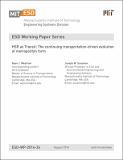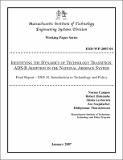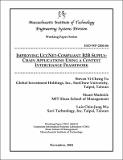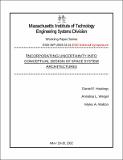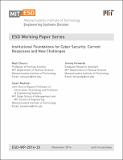Browsing Engineering Systems Division (ESD) Working Paper Series by Title
Now showing items 119-138 of 273
-
Heterogeneity and Network Structure in the Dynamics of Diffusion: Comparing Agent-Based and Differential Equation Models
(Massachusetts Institute of Technology. Engineering Systems Division, 2004-11)When is it better to use agent based (AB) models, and when should differential equation (DE) models be used? Where DE models assume homogeneity and perfect mixing within compartments, AB models can capture heterogeneity ... -
Heterogeneous Unit Clustering for Efficient Operational Flexibility Modeling for Strategic Models
(Massachusetts Institute of Technology. Engineering Systems Division, 2013-01)The increasing penetration of wind generation has led to significant improvements in unit commitment models. However, long-term capacity planning methods have not been similarly modified to address the challenges of a ... -
Hiring College Graduates to Flip Hamburgers: An Endogenous Theory of Professionalization
(Massachusetts Institute of Technology. Engineering Systems Division, 2014-03)In this paper, we offer an endogenous theory of professionalization and ever-higher degree attainment. We theorize that higher education is a self-driving growth engine. We introduce two endogenous mechanisms that act on ... -
The Historical Roots of the Field of Engineering Systems: Results from an In-class Assignment
(Massachusetts Institute of Technology. Engineering Systems Division, 2012-03)The field of Engineering Systems (ES) is quite young but there are intellectual roots that go far back in time. At least that is the working hypothesis in an integrative capstone assignment given in the first doctoral ... -
Holistic Trinity of Services Sciences: Management, Social, & Engineering Sciences
(Massachusetts Institute of Technology. Engineering Systems Division, 2007-04)Services industries comprise about 75% of the economy of developed nations. To design and operate services systems for today and tomorrow, we need to educate a new type of engineer who focuses not on manufacturing but on ... -
House of Project Complexity – Understanding Complexity in Large Infrastructure Projects
(Massachusetts Institute of Technology. Engineering Systems Division, 2013-05)This paper describes our conceptualization of complexity in Large Infrastructure Projects (LIPs). Since complexity itself is an emergent concept that is hard to pin down, we focus on the relationship between various project ... -
House of Security: Locale, Roles and Resources for Ensuring Information Security Research-in-Progress
(Massachusetts Institute of Technology. Engineering Systems Division, 2006-08)In this paper we redefine information security by extending its definition in three salient avenues: locale (beyond the boundary of an enterprise to include partner organizations), role (beyond the information custodians’ ... -
How Useful is Quantitative Risk Assessment?
(Massachusetts Institute of Technology. Engineering Systems Division, 2003-07)This article discusses the use of Quantitative Risk Assessment (QRA) in decision-making regarding the safety of complex technological systems. The insights gained by QRA are compared with those from traditional safety ... -
HSR as Transit: The continuing transportation-driven evolution of metropolitan form
(Massachusetts Institute of Technology. Engineering Systems Division, 2014-08)With high-speed rail (HSR) now often fulfilling a commuting function within an hour’s travel time from principal metropolitan cities, it becomes the latest in a long line of transportation technologies to elicit change in ... -
Identifying the Dynamics of Technology Transition: ADS-B Adoption in the National Airspace System
(Massachusetts Institute of Technology. Engineering Systems Division, 2007-01)Congestion is a growing problem in the National Airspace System (NAS). Predictions indicate that the NAS, as a whole, will be operating at 75% of capacity by 2010 [2] and that the demand in capacity in air transportation ... -
The impact of high-speed rail and low-cost carriers on European air passenger traffic
(Massachusetts Institute of Technology. Engineering Systems Division, 2013-07)The expansion of high-speed passenger rail service is often argued as a potentially effective, lower-carbon substitute for intercity air travel. Previous studies on high-speed rail on air travel in Europe and Asia have ... -
The Impact of Instability on Complex Social and Technical Systems
(Massachusetts Institute of Technology. Engineering Systems Division, 2002-05)Instability is a pervasive phenomenon that has deep implications for virtually all complex social and technical systems. In engineering, the identification and mitigation of various types of technical instabilities is a ... -
Improving the Software Upgrade Value Stream
(Massachusetts Institute of Technology. Engineering Systems Division, 2001-12)This paper reports findings from a two-year study to identify Lean practices for deriving software requirements from aerospace system level requirements, with a goal towards improving the software upgrade value stream. The ... -
Improving the Systems Engineering Process with Multilevel Analysis of Interactions
(Massachusetts Institute of Technology. Engineering Systems Division, 2014-03)The systems engineering V (SE-V) is an established process model to guide the development of complex engineering projects (INCOSE, 2011). The SE-V process involves decomposition and integration of system elements through ... -
Improving UccNet-Compliant B2B Supply-Chain Applications Using a Context Interchange Framework
(Massachusetts Institute of Technology. Engineering Systems Division, 2004-11)UccNet (http://knowledgebase.uccnet.org) is a globally centralized B2B electronic data platform for storing trading product item information and hosted by the non-profit international standardization institute EAN-UCC. It ... -
Incorporating Uncertainty Into Conceptual Design of Space System Architectures
(Massachusetts Institute of Technology. Engineering Systems Division, 2002-05)The environment in which space systems are developed and operated can be classified as nothing less than dynamic. However, it is clear that the methods and tools relied on in conceptual design are based on static assumptions ... -
Initial Top-Level Characterization of the Air Force Sustainment System
(Massachusetts Institute of Technology. Engineering Systems Division, 2001-04)This draft white paper presents an initial top-level characterization of the Air Force sustainment system. The first part of the paper gives an overview of the proposed conceptual framework for system characterization. The ... -
Innovation Dynamics in the Development of Nuclear Energy and Electric Vehicles in France
(Massachusetts Institute of Technology. Engineering Systems Division, 2014-04)Technological change is shaped by a confluence of processes that are governed by socio-political, economic, and regulatory factors within a region. In this paper we describe the transformation of the electricity generation ... -
Innovative Concept Model Design for Linking Physicians to the System of Patient-Centered Care with Advancing Technologies in the World of Diabetes
(Massachusetts Institute of Technology. Engineering Systems Division, 2013-12)This concept paper applies the concepts of complex sociotechnical engineering systems to the care and management of type 2 diabetes. It also includes an innovative design model that integrates the existing ecosystem of ... -
Institutional Foundations for Cyber Security: Current Responses and New Challenges
(Massachusetts Institute of Technology. Engineering Systems Division, 2014-11)Almost everyone recognizes the salience of cyberspace as a fact of daily life. Given its ubiquity, scale, and scope, cyberspace has become a fundamental feature of the world we live in and has created a new reality for ...









